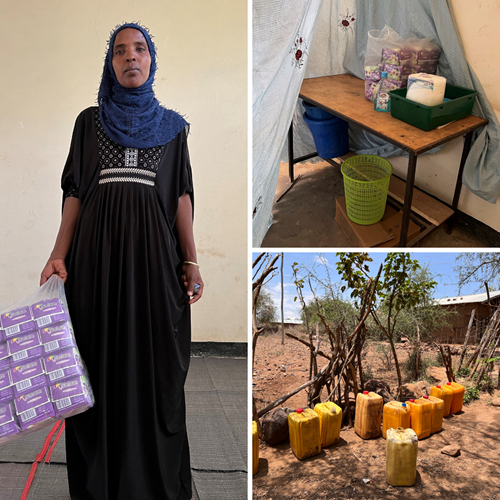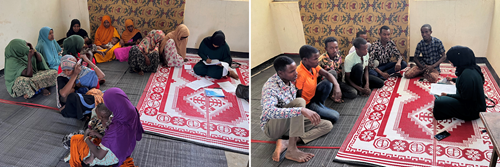Baby-steps towards ending period poverty and stigma

A women's focus group in Meirab Abaya, SNNPR. @Photos courtesy of Rediet Seleshi Mekonnen.
A women's focus group in Meirab Abaya, SNNPR. @Photos courtesy of Rediet Seleshi Mekonnen.
Following a recent field visit, Rediet Seleshi Mekonnen, the menstrual hygiene management lead in a new water, sanitation and hygiene project in rural Ethiopia, reflects on the situation facing girls. Speaking with them directly, their mothers and fathers as well as teachers and boys, she outlines the need to reduce shame and misconceptions while improving access to affordable products.
“Girls get no awareness from family or their mother. They come to ask me when they start experiencing their first period.”
A gender focal teacher at one of the schools Rediet visited.
During my recent field trips in Southern Nations, Nationalities, and Peoples' Region (SNNPR) and Diredawa, Ethiopia, I have seen the progress and challenges around menstrual hygiene management (MHM) in schools. These issues are due to low awareness about menstruation and a lack of access to sanitary products that give adolescent girls a sense of security.
The shame of talking about menstruation, and the stigma that revolves around it, is hindering progress. This topic is like a hot potato that nobody wants to touch even though education about menstrual hygiene is the right of every girl. Mothers think their daughters will get information from teachers, and teachers say that mothers have to be able to educate their children.
Fathers also assume that girls talk about their period with their mothers. “My daughters don’t talk to me directly. They talk to their mother. I give their mother money and she gives them money to buy pads,” a father said during one focus group discussion. “Mothers cover up when the daughter has her period saying, ‘She’s having a headache,’ so women and girls are not open to talking about it culturally,” said another male participant.
When we ask mothers about their actual experience when it comes to discussing menstruation with their daughters, they say the girls are still shy to talk about it. One mother asked, “Why is a girl starting her first period by the age of 12? Is it because she started having a relationship or because of the workload at home? Because from my experience, my period started after I was old enough, around the age of 18.”
It is clear mothers are concerned; sometimes there is a lack of education on why girls start menstruating at a younger age and other taboos or misinformation.
As a result of these misconceptions and the lack of conversations with family members and teachers, girls are often shocked when they have their first period. When I asked girls about their sources of information about menstruation, they say they talk with their friends, though some mentioned that they do talk with the gender focal teacher at the school thanks to the awareness outreach that has been started there. One girl in Wahil cluster, Diredawa, mentioned “I was having back pain a lot, and a friend of mine told me it may be my period. I was like, ‘How can I bleed if I’m not cut?’ I thought I was gonna die but they told me it’s ok. Then my close friend who started seeing her period told me a few things and I started my period after two days.”

The Gender focal at Legeoda Gudunfeta School, Diredawa, holding pack of pads and some images from Meirab Abaya in SNNPR.
Institutional support
Progress around MHM awareness is being made at schools and schools are trying hard to have a dedicated MHM room, provide sanitary pads for emergency use, and educate boys as well. But there is no material or a standardized guide being used by the schools to educate girls, and the supply of sanitary pads is inconsistent. “Every week, the girls club meets and discusses. They have a program on sanitation. Sometimes they invite biology or science teachers,” the school director said. Often teachers or the gender focal teacher uses their own experience to educate girls about menstruation, how they should manage it, and what products they can use. This is meaningful and far better than having no conversation but still is open to bias.
Education about menstruation plays a huge role in girls’ confidence. It helps them to be ready and ask for support when they are in school, and the efforts made at school play a positive role in girls’ school attendance. One of the girls said, “If I’m prepared, I feel comfortable but if I didn’t wear a pad or bring a pad, I feel concerned and uncomfortable.”

Menstrual hygiene focus groups with women and boys
at Legeoda Gudunfeta School, Diredawa
About SCRS WASH TAP
The Strengthening Climate Resilient Systems for Water, Sanitation and Hygiene Services in Ethiopia Technical Assistance Project (SCRS WASH TAP) is a four-year (January 2021 – August 2024) UK Foreign and Commonwealth Development Office (FCDO) funded project to strengthen systems of delivery setups in the SCRS WASH intervention areas. This technical assistance aims to amplify the impact of the financial aid component of SCRS WASH and is implemented by both UNICEF (Urban WASH) and NIRAS. The NIRAS TA contract was awarded to a consortium led by NIRAS-LTS.
Providing disposable sanitary pads is a financial concern for parents because of the cost of pads and the increase of cost over time. The current price for a pack containing ten disposable sanitary pads ranges between ETB35-50 (USD0.65-1.00). “We use modes or disposable sanitary pads when we have money, but we usually use a cloth because we would rather save the money and give a better life for our kids,” one of the mothers said. Some mothers also think it’s not wise to buy disposable pads as they are not reusable after one use. Another mother said, “Our daughters play with our money and throw it,” when she expressed how expensive disposable sanitary pads are, continuing, “We use cloth, but our daughters are not willing to do this. They say that we need to give them money to buy sanitary pads otherwise they say, ‘Why did you bring me to this world.’ It’s tough.”
Even though schools try to create gender clubs and include MHM education as part of it, there is inconsistent budget for supply that puts purchasing sanitary pads into consideration. “We have pads available in the school for emergency use, but it’s not enough. We don’t have a budget, so teachers contributed some money at the beginning of the year to purchase the pads,” one school director said. Another school director said, “We have allocated ETB1,500 annually to purchase sanitary pads and bought three cartons at the beginning of the year,” but this is not enough compared to the number of menstruating girls in the school.
A way forward
Going out in the field always helps me see the challenges up close. It’s totally different from what we visualize and discuss in our offices. The issues related with MHM are deep and circular. Addressing them requires participation and ownership from different stakeholders. Standardizing MHM teaching materials, improving access to WASH facilities and affordable and reusable Menstrual Hygiene Management products, and improved knowledge development through behavioural change education are just a few examples. SCRS WASH TAP is assisting the Government of Ethiopia in tackling these issues, with a focus on building a solution that allows the private sector to play a more central role in improving access to affordable MHM products in targeted schools.

